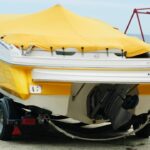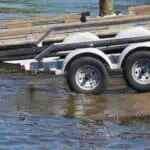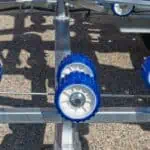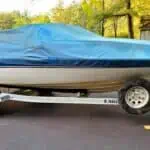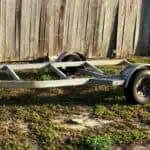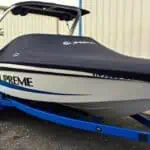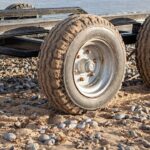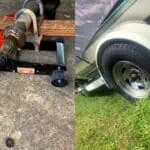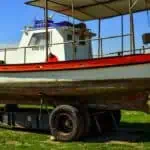Boat trailer tires are designed to endure long hours on the road and provide a smooth ride for your boat. However, even the best tires can succumb to wear and tear, especially if they’re not properly inflated or maintained. If you find yourself constantly replacing blown-out boat trailer tires, it’s important to understand the root cause of the issue.
In most cases, blown-out boat trailer tires are caused by one (or more) of the following factors: overloading, underinflation, excessive speed, and improper tire alignment.
If you’ve ever had a blowout while driving your boat trailer, you know how frustrating it can be. Not only do you have to deal with the hassle of changing a tire, but you also have to worry about the safety of your boat and everyone on board.
There are a few different reasons why boat trailer tires might keep blowing out.
One possibility is that the tires are simply too old and need to be replaced. Another possibility is that the tires are not inflated properly. When tires are under-inflated, they generate more heat, which can lead to blowouts.
Finally, it’s also possible that the rims on your boat trailer are damaged or warped. If this is the case, then it’s time for some new rims!
If you’re having trouble with blown-out tires on your boat trailer, take a look at these possible causes and see if there’s anything you can do to fix the problem.
Why Do My Boat Trailer Tires Keep Blowing Out?
Why is My Boat Trailer Tires Wearing on the Inside?
If you notice that your boat trailer tires are wearing on the inside, it’s likely due to incorrect inflation. When tires are underinflated, the weight of the trailer and boat puts more pressure on the sides of the tire closest to the ground. This causes the tire to flex and bend more than it should, which leads to premature wear.
To avoid this problem, make sure you check your tire pressure regularly and inflate your tires to the proper level before each trip. This will help extend the life of your tires and keep your trailer rolling down the road safely.
How Do You Prevent Tires from Blowing Out?
One of the best ways to avoid having a tire blowout is to regularly check your tires’ air pressure and tread depth. You should also have your tires rotated every 5,000 miles or so. If you notice any bald spots or cracks in your tires, it’s time to replace them.
Another way to help prevent tire blowouts is to avoid overloading your vehicle. Be sure not to exceed the weight limit for your tires. Also, be mindful of how you distribute weight in your vehicle when packing it for a trip.
An unevenly distributed load can put undue stress on certain tires and cause them to fail.
If you find yourself driving on a lot of rough roads, try to maintain a moderate speed. Driving too fast over potholes and other obstacles can damage your tires and lead to a blowout.
If you must drive over these types of terrain, go slowly and carefully.
In general, taking good care of your tires will help prevent them from blowing out unexpectedly. By checking their pressure and tread depth regularly, you can catch any problems early on before they become serious issues.
And by avoiding overload and excessive speeds, you can keep your tires in good condition for many miles to come.
Why Do My Tires Keep Blowing Out?
One of the most common questions we get here at TireBuyer is, “Why do my tires keep blowing out?” While it may seem like a tire blowout is happening more and more often, it’s a pretty rare event. But when it does happen, it can be really dangerous.
Here’s what you need to know about tire blowouts, how to prevent them, and what to do if you find yourself in the middle of one. What is a tire blowout? A tire blowout occurs when the air pressure inside the tire becomes too much for the tire walls to contain.
This can happen for several reasons, but most often it’s due to over-inflation or damaged tires. When a blowout happens, all of that built-up air pressure is released in an instant and can cause the tire to come flying off the rim. If you’re lucky enough to keep control of your vehicle during a blowout (which isn’t always easy), you’ll still likely experience decreased handling ability and extended braking distances.
In other words: don’t take your foot off the gas pedal and don’t slam on your brakes! Instead, gently ease off the accelerator and brake slowly and evenly until you come to a stop. Once you’re safely stopped, turn on your hazard lights and call for help.
How can I prevent a tire blowout? The best way to prevent a tire blowout is by regularly checking your tires – both their air pressure and overall condition. You should check your air pressure at least once a month (and more often if you live in an area with extreme temperatures), using an accurate gauge – not just going by eyeballing it.
” As for inspecting your tires themselves, give them a good look every time you rotate them or get an oil change (at least every 6 months). Look for any cuts or punctures in the tread or sidewall; if you see anything that looks concerning, have it checked out by a professional as soon as possible before driving on it any further. And lastly – don’t forget about proper wheel alignment and balancing!
These are important factors in maintaining even tread wear which helps prevent premature balding or damage that could lead to Blowouts.
Why Do My Trailer Tires Go Bald So Fast?
If you’re noticing that your trailer tires are going bald faster than usual, there could be a few different reasons. First, check to see if the load on your trailer is evenly distributed. If it’s not, that could be causing premature wear on certain areas of the tire.
Also, make sure that your trailer tires are properly inflated – both underinflated and overinflated tires can cause increased wear. Finally, take a look at your towing habits. Are you constantly making sharp turns or braking hard?
That can also lead to premature tire wear.
Tandem Axle Trailer Tire Blowout
Recently, there have been several reports of tandem axle trailer tire blowouts. This is a serious safety issue that can lead to accidents and injuries. Here are some things you should know about tandem axle trailer tire blowouts:
What causes them: Tandem axle trailer tire blowouts are typically caused by overloading or incorrect inflation. Overloading can cause the tires to heat up and eventually fail. Incorrect inflation can also cause the tires to overheat and fail.
How to prevent them: The best way to prevent tandem axle trailer tire blowouts is to make sure that your tires are properly inflated and that you don’t overload your trailer. Additionally, regular maintenance on your tires will help ensure their longevity. What to do if you have one: If you experience a tandem axle trailer tire blowout, the first thing you should do is pull over safely and stop your vehicle.
Once you’ve stopped, check for damage and leaks. If there are no leaks, you may be able to continue on your journey by inflating the tire with an air compressor. However, if there is significant damage or a leak, it’s best to call for roadside assistance or tow your vehicle to a nearby service station.
Tandem axle trailer tire blowouts can be dangerous and costly. By being aware of the causes and taking preventive measures, you can help keep yourself safe on the roadways.
What Causes Trailer Tires to Get Hot
One of the most common questions we get here at Trailer Wheel & Tire is: “Why are my trailer tires getting hot?” While there could be several reasons for this, one of the most likely culprits is an over-inflated tire. Here’s why: Over-inflation causes the tire to ride on just the middle third of the tread.
This makes for a smaller contact patch, which in turn generates more heat. That heat builds up and can cause tire failure. To avoid this, always check your tire pressure before you hit the road.
A good rule of thumb is to inflate your trailer tires to 10% below the maximum psi rating listed on the sidewall. For example, if your trailer tire has a max psi rating of 80, you would want to inflate it to 72 psi. Keep an eye on your tires while you’re driving and if you notice they’re starting to get hot, pull over and let them cool down before continuing on your journey.
If you have any further questions about keeping your trailer tires in tip-top shape, don’t hesitate to give us a call or stop by our shop!
Can You Drive a Trailer With a Blown Tire
If you’ve ever been on the highway and had a tire blowout, you know how scary it can be. Your first instinct is to get off to the side of the road as soon as possible. But what if you’re driving a trailer?
Can you drive a trailer with a blown tire? The answer is yes, but it’s not recommended. Driving on a flat or blown tire can damage the rim and cause further problems.
If possible, it’s best to replace the tire before continuing your journey. If you find yourself in a situation where you must drive on a blown tire, there are some things you should keep in mind. First, go slowly.
Driving too fast will put a strain on the rim and could cause further damage. Second, avoid sharp turns or sudden stops. This could cause the trailer to tip over.
And finally, be aware of other drivers around you. They may not see you as easily as they would another car on the road. Driving on a blown tire isn’t ideal, but if you find yourself in this situation it’s important to stay calm and take extra precautions.
Trailer Tire Failure
A trailer tire failure can be a serious and even deadly event. It is important to know the causes and how to prevent them. There are three main causes of trailer tire failures: overloading, underinflation, and speed.
All three of these factors can lead to heat build-up in the tires, which can cause them to fail. Overloading is the most common cause of trailer tire failures. The weight of the load on the trailer tires must not exceed the maximum capacity for the tires.
If it does, the extra weight can cause the tires to overheat and fail. Underinflation is another leading cause of tire failure. Trailer tires should be inflated to their proper pressure as listed on the sidewall of the tire.
If they are not, they will run hotter than they should and can fail. Speed is also a factor in tire failure. The faster you go, the more heat builds up in the tires.
This heat can cause tread separation and blowouts.
How Do You Know If Your Rv Tires are Bad
RV tires are just like any other type of tire, in that they can go bad over time. There are a few things that you can look for to tell if your RV tires are bad and need to be replaced. One of the first things to look for is cracks or splits in the sidewalls of the tires.
These can happen over time from weathering and exposure to the elements, and they can also happen if the tire has been driven on while underinflated. If you see any cracks or splits, it’s time to replace the tire. Another thing to look for is uneven wear patterns on the tread of the tire.
This can be caused by driving habits or by something as simple as having an incorrect wheel alignment. If you see uneven wear, it’s important to get your RV aligned properly and then have the tires checked to see if they need to be replaced. Finally, pay attention to how your RV handles on the road.
If you notice that it seems to be pulling to one side or that the ride is rougher than usual, it could be a sign that one or more of your RV tires are starting to fail. Get them checked out as soon as possible so you don’t end up stranded on the side of the road with a blowout!
Boat Trailer Tires
If you own a boat, chances are you’ll also need a trailer to haul it around. And just like any other vehicle, your trailer has tires that will eventually need to be replaced. Here’s what you need to know about boat trailer tires.
The most important thing to know about boat trailer tires is that they’re not the same as regular car or truck tires. Boat trailer tires are designed specifically for hauling heavy loads over long distances, so they’re built tougher and can handle more weight than regular passenger vehicle tires. When shopping for new boat trailer tires, make sure to get the right size and load rating for your specific needs.
You can find this information in your owner’s manual or on the tire itself. Once you have the right size and load rating, you can start shopping around for the best deal. Be sure to inspect your boat trailer tires regularly for signs of wear and tear.
If you notice any cracks, bulges, or other damage, it’s time to replace the tire. It’s better to be safe than sorry when it comes to your boat trailer tires!
Motorhome Tire Blowout
RV tire blowouts are not fun. They are scarring and can cause serious damage to your RV. Here’s what you need to know about RV tire blowouts, and how to avoid them.
What Causes an RV Tire Blowout? There are a few different things that can cause an RV tire blowout. The most common is overloading the tires.
This means putting too much weight on the tires, which causes them to break down and eventually burst. Another common cause of RV tire blowouts is driving too fast. This puts a lot of stress on the tire and can cause them to heat up and eventually explode.
Finally, if you hit a pothole or something else while driving, it can also cause an RV tire blowout. How Can You Avoid an RV Tire Blowout? There are a few things you can do to avoid having an RV tire blowout.
First, make sure you don’t overload your tires by checking the weight limit before adding anything to your RV. Second, drive slowly and carefully to avoid putting too much stress on the tires. And finally, be careful when driving over bumps or potholes so you don’t damage the tires.
If you follow these tips, you should be able to avoid having an RV tire blowout. But if one does happen, don’t panic! Just pull over as soon as possible and call for help.
Overloaded Trailer Tires
An overloaded trailer can put a strain on your vehicle’s suspension and cause your tires to wear out prematurely. It is important to know the weight capacity of your trailer and make sure you do not exceed it.
If you are hauling a lot of heavy cargo, you may need to upgrade to a bigger and heavier-duty trailer.
You will also need to make sure that your vehicle can handle the extra weight. Be sure to check your owner’s manual or consult with a mechanic before making any changes.
If you overload your trailer, you will likely notice some negative effects on how your vehicle drives.
The steering may feel heavier and the brakes may not work as well. You may also notice that your tires are wearing down more quickly than usual.
Overloaded trailers can be dangerous and should be avoided.
Be sure to know the weight limit of both your trailer and your vehicle before heading out on the road.
Conclusion
If you’re having trouble with your boat trailer tires blowing out, it might be time to check your tire pressure. Tire pressure is one of the most important factors in keeping your tires from blowing out. Overinflated tires can blow out more easily, so be sure to check your tire pressure and adjust it accordingly.
If you’re still having trouble, it might be time to replace your tires.
